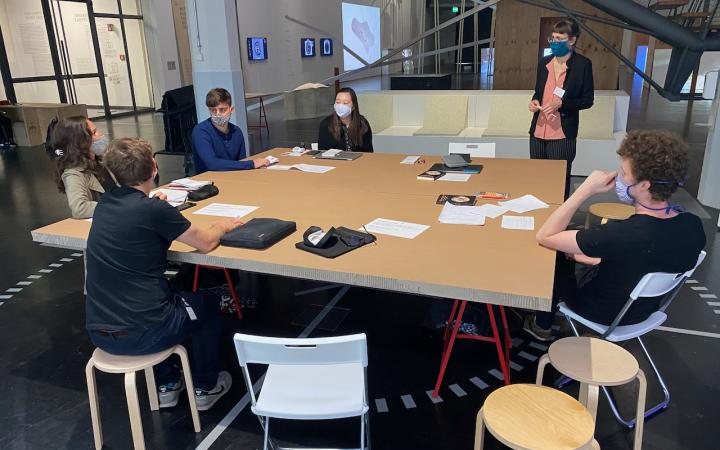A cinematic examination of the exhibition »Critical Zones«
A contribution of the seminar excursion of the Film University Babelsberg KONRAD WOLF

The seminar excursion from the Film University Babelsberg KONRAD WOLF devoted four days to the exhibition »Critical Zones« and the books »The Terrestrial Manifesto« by Bruno Latour and »Remaining Restless: The Kinship of Species in the Chthulucene« by Donna Haraway. Students from different disciplines and years, a PhD student and two professors conducted dialogues in the exhibition on topics such as »Becoming Terrestrial«, »Tentacular Thinking«, »Symbiogenesis«, »Gaia« or the »Chthulucene« – a new age of learning, which could be a way to overcome the anthropocentric »Capitalocene«. Through the critique of Bruno Latour by a Canadian Métis anthropologist and Indigenous studies scholar, Zoe Todd, addressed in the seminar, the concept of »Silap Inua« was connected to the exhibition.
The results of the philosophical-artistic seminar are now available in cinematic form.
Prologue - Tentacular Thinking
The video is the introduction and prelude to the small film series and forms an immersion into Donna Haraway's idiosyncratic word creations and mental connections. The interwoven voices of the seminar participants speak out individual terms that they have dealt with particularly intensively; these intertwine – like meandering tentacles – with the image that scans the ghostly empty Berlin central station hall level by level: unexpected connotations and questions arise in this restless place of passage, which is a symbol of precisely that modern way of life that needs to be critically rethought.
Prof. Dr. Christine Reeh-Peters is junior professor for theory and practice of artistic research in digital media at the Filmuniversität Babelsberg KONRAD WOLF.
IMPULSE RESPONSE
The exhibition »Critical Zones« is based on digital technology and sets a machine in (electronic) motion. It stabs and rubs, it hums and smokes, until it returns and affects the person receiving it. Every sound in the work »IMPULSE RESPONSE« comes from recordings Michael Kondaurow made while visiting the exhibition. These were edited and alienated in post-production.
Michael Kondaurow is a student in the MA program »Sound for Picture« at the Film University Babelsberg KONRAD WOLF.
Silap Inua
Kristina Mareike Almedom takes up a concept coined by the Inuit: »silla« ('possessor of spirit', ᓯᓚᑉ ᐃᓄᐊ) or also »Silap Inua« ('breath, spirit', ᓯᓪᓚ) becomes in the video a breath liberating the world and permeating everything. Silla is originally a spirit of the sky, wind and weather, but also the breath of life itself. Almedom poetically juxtaposes this idea with the images of an industrial landscape of the capitalist system and the resulting ecological problems.
Kristina Mareike Almedom is a dramaturg and is a 6th semester student in the MA program »Screenplay/Dramaturgy« at the Filmuniversität Babelsberg KONRAD WOLF.
Sila, Silap Inua, Silla
»The word 'sila' has several meanings, most often referring to the environment, such as the phrases silami qanuippa? (how is the weather?) or silaup asijjipallianinga (climate change). However, the other meaning of sila refers to wisdom or prudence as in silatujuq (he/she/it is intelligent, reasonable or wise).« (Translation by: Keavy Martin. »Stories in a New Skin: Approaches to Inuit Literature« (2012).) In her video work, Alisi Telengut addresses this complexity of the word »sila« and relates it to the notion of »critical zones.«
Alisi Telengut is an animated filmmaker and, since 2019, a doctoral candidate of the scientific-artistic PhD program at Filmuniversität Babelsberg KONRAD WOLF.
Make Nature Great
Angelica Böhm's artistic research is about using the expertise of cinematic scenography to visualize positive futures for achieving climate goals. Instead of the usual sci-fi dystopias, possible solution ideas are imagined and made tangible in scenarios. These are presented in concept designs. The video »Make Nature Great« refers to this technique and is an appeal not to focus exclusively on human concerns. It is a reflection and an inner dialogue with the exhibition »Critial Zones« and the reference to Donna Haraway's theories established in the philosophical-artistic seminar.
Prof. Angelica Böhm is professor of scenography at the Filmuniversität Babelsberg KONRAD WOLF.
Further links:
Start with the observation
The work refers to the eponymous first area of the exhibition »Critical Zones« and understands it as a call to action to actually start observing, here and now. In his video, Florian Merz therefore transfers the task of observing to everyday culture and looks at the video culture of young influencers using an invented example. As a Youtube blogger, the protagonist gives supposedly good tips for health and asks for particularly many »likes«, i.e. positive reactions from the viewers. Merz distances himself by observing critically and shows that the persistence of questionable actions is largely rooted in unreflected (auto)didactic processes.
Florian Merz is a 6th semester student in the BA program »Screenplay/Dramaturgy« at the Film University Babelsberg KONRAD WOLF.
Texts and video contributions from the seminar of Prof. Dr. Christine Reeh-Peters in cooperation with the students of the Filmuniversität Babelsberg KONRAD WOLF.